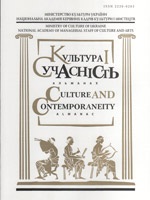СИНЕРГІЯ ТРАДИЦІЙ І НОВАЦІЙ ЯК ПІДҐРУНТЯ ІСНУВАННЯ КУЛЬТУРИ
DOI:
https://doi.org/10.32461/2226-0285.1.2019.180830Ключові слова:
традиції, новації, гармонія, синергія, соціокультурні зміни, культураАнотація
Мета статті – проаналізувати важливість гармонійного поєднання традицій і новацій для існування ку- льтури. Методологія дослідження ґрунтується на комплексному поєднанні як загальнонаукових методів, так і методів, інтегрованих з низки підходів, – філософського, культурологічного, історичного, соціологічного. На- укова новизна полягає в обґрунтуванні необхідності гармонійного поєднання традицій і новацій для збере- ження підґрунтя існування культури в умовах модернізаційних змін. Висновки. Найбільша гармонія між традиціями і інноваціями спостерігається в суспільствах, в яких модернізаційні процеси мають характер пос- тупальних органічних змін, що убезпечує культуру від кризових явищ. В інноваційно-інформаційних суспільс- твах роль традицій більш важлива, ніж у традиційних, позаяк в саме в них традиції виконують роль своєрідного регулятора і стабілізатора суспільних процесів, виступаючи у якості, з одного боку, ресурсної бази, яка забез- печує постійне продукування адаптивних механізмів, а з іншого - знижує надмірну динаміку новацій. Тому основне завдання сучасних новацій – це органічно вписатися в традиційну соціокультурну цілісність, стати її частиною, розчинитися тощо.
Посилання
Александер Дж. С. Аналитические дебаты: Понимание относительной автономии культуры // Соци- ологическое обозрение. 2007. Т. 6. ғ 1. С. 17–37.
Александер Дж. Смыслы социальной жизни: культурсоциология. Москва : Праксис, 2013. 630 c.
Анохина В. В. Культурная традиция в контексте современной социальной динамики // Гуманітар- ний вісник ЗДІА. 2010. Вип. 42. С. 90–101.
Геодакян В. А. Эволюция асимметрии, сексуальности и культуры (Что такое культура с точки зре- ния теоретической биологии?) // Труды Междунар. симпозиума «Взаимодействие человека и культуры: теоре- тико-информационный подход. Информационное мировоззрение и эстетика». Таганрог, 1998. С. 116–143.
Гидденс Э. Последствия современности; пер. с англ. Г. Ольховикова, Д. Кибальчича. Москва : Пра- ксис, 2011. 352 с.
Гидденс Э. Ускользающий мир. Как глобализация меняет нашу жизнь. Москва: Весь мир, 2004.
Зеленков А. И. Динамика биосферы и социокультурные традиции. Мн.: Изд-во «Университетское», 1987. 239 с.
Лисицкий А. В. Культурное наследие как ресурс устойчивого развития: автореф. дис. канд. культу- рологии: 24.00.01. Москва, 2005. 21 с.
Плахов В. Традиции и общество: опыт философско-социологического исследования. М.: Мысль, 1982. 220 с.
Сорокин П. А. Человек. Цивилизация. Общество [Общ. ред., сост. и предисл. А. Ю. Согомонова]. Москва: Политиздат, 1992. 542 с.
Чистов К. В. Народные традиции и фольклор. Очерки теории. Ленинград: Наука, 1986. 304 с.
Шацкий Е. Утопия и традиция. М.: Прогресс, 1990. 456 с.
Eisenstadt S. N. Tradition, change, andmodernity. New York, 1973. 367 р.
Shils E. Tradition. Chicago: University of Chicago Press, 1981. 342 р.
Alexander J. S. Analytical debate: Understanding the relative autonomy of culture. Sociological Review. 2007. T. 6, 17-37 [in Russian].
Alexander J. (2013) Senses of social life: cultural sociology. Moscow: Praxis. [in Russian].
Anokhina V.V. Cultural tradition in the context of modern social dynamics. Humanitarian Bulletin ЗДІА. 2010. 42, 90-101. [in Russian].
Geodakyan V.A. Evolution of asymmetry, sexuality, and culture (What is culture from the point of view of theoretical biology?). Proceedings of the International. symposium "Interaction of man and culture: theoretical and informational approach. Information worldview and aesthetics ". Taganrog, 1998, 116-143. [in Russian].
Giddens E. (2011). Consequences of the present; per. from English G. Olkhovikova, D. Kibalchicha. Moscow: Praxis [in Russian].
Giddens E. (2004). Escalating world. How Globalization Changes Our Life. Moscow: The whole world [in Russian].
Zelenkov A.I. (1987). Dynamics of the biosphere and sociocultural traditions. Minsk [in Russian].
Lisitsky A.V. (2005). Cultural Heritage as a Resource of Sustainable Development: Author's abstract. dis Cand. Cultural Studies: 24.00.01. Moscow
Plakhov V. (1982) Traditions and Society: the Experience of Philosophical and Sociological Research. M .: Thought [in Russian].
Sorokin P.A. ( 1992) Man. Civilization Society [Society. ed., comp. and the prelude A. Yu. Sogomonov]. Moscow: Politizdat [in Russian].
Chistov K.V. (1986) Characteristics of folk traditions and folklore. Essays on the theory. Leningrad: Science [in Russian].
Shatsky E. (1990) Utopia and tradition. M .: Progress [in Russian].
Eisenstadt S. N. (1973) Tradition, change, andmodernity. New York.[in English].
Shils E. (1981). Tradition. Chicago: University of Chicago Press [in English].
##submission.downloads##
Опубліковано
Номер
Розділ
Ліцензія

Ця робота ліцензується відповідно до Creative Commons Attribution 4.0 International License.
Автори, які публікуються у цьому журналі, погоджуються з наступними умовами:
- Автори залишають за собою право на авторство своєї роботи та передають журналу право першої публікації цієї роботи на умовах ліцензії Creative Commons Attribution License, котра дозволяє іншим особам вільно розповсюджувати опубліковану роботу з обов'язковим посиланням на авторів оригінальної роботи та першу публікацію роботи у цьому журналі.
- Автори мають право укладати самостійні додаткові угоди щодо неексклюзивного розповсюдження роботи у тому вигляді, в якому вона була опублікована цим журналом (наприклад, розміщувати роботу в електронному сховищі установи або публікувати у складі монографії), за умови збереження посилання на першу публікацію роботи у цьому журналі.
- Політика журналу дозволяє і заохочує розміщення авторами в мережі Інтернет (наприклад, у сховищах установ або на особистих веб-сайтах) рукопису роботи, як до подання цього рукопису до редакції, так і під час його редакційного опрацювання, оскільки це сприяє виникненню продуктивної наукової дискусії та позитивно позначається на оперативності та динаміці цитування опублікованої роботи (див. The Effect of Open Access.


